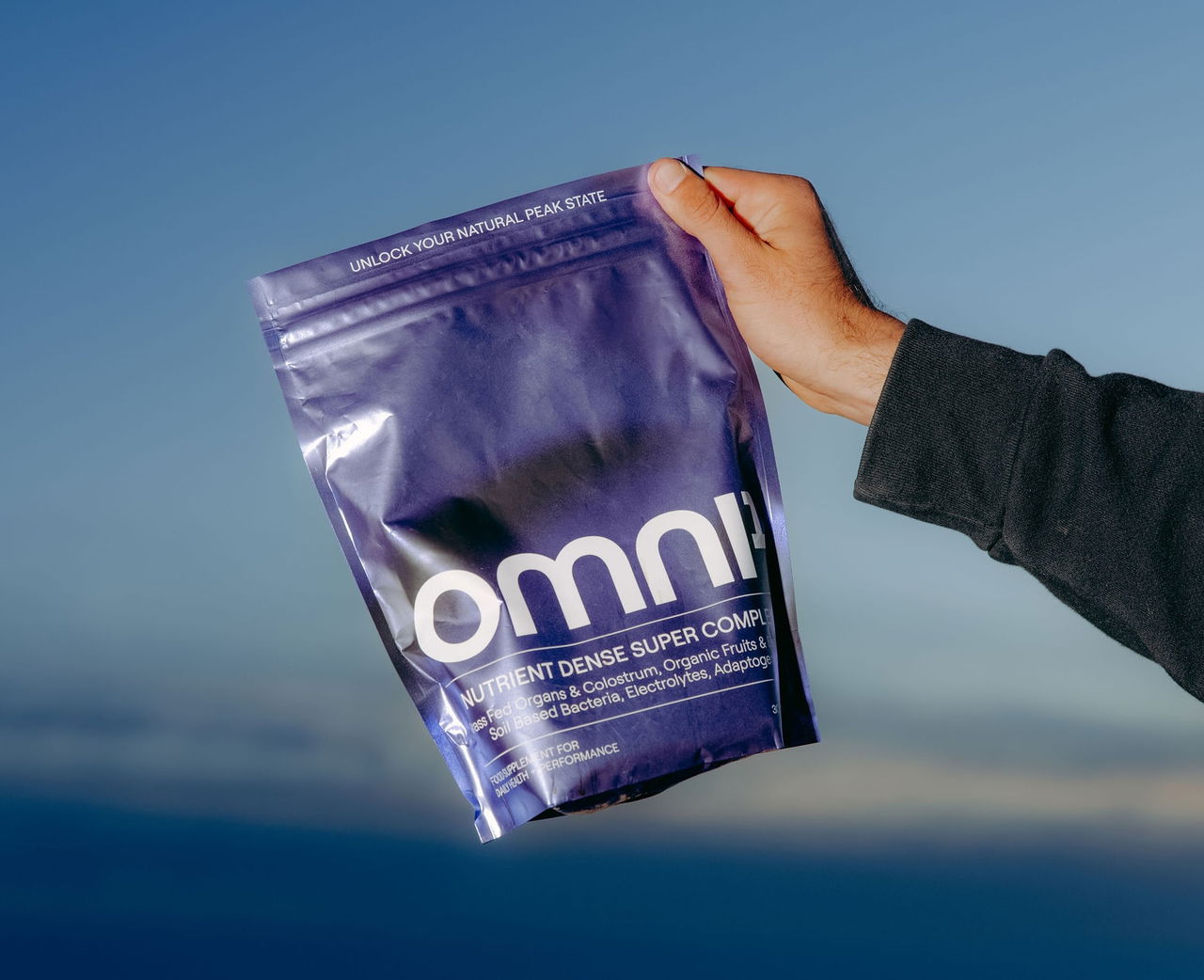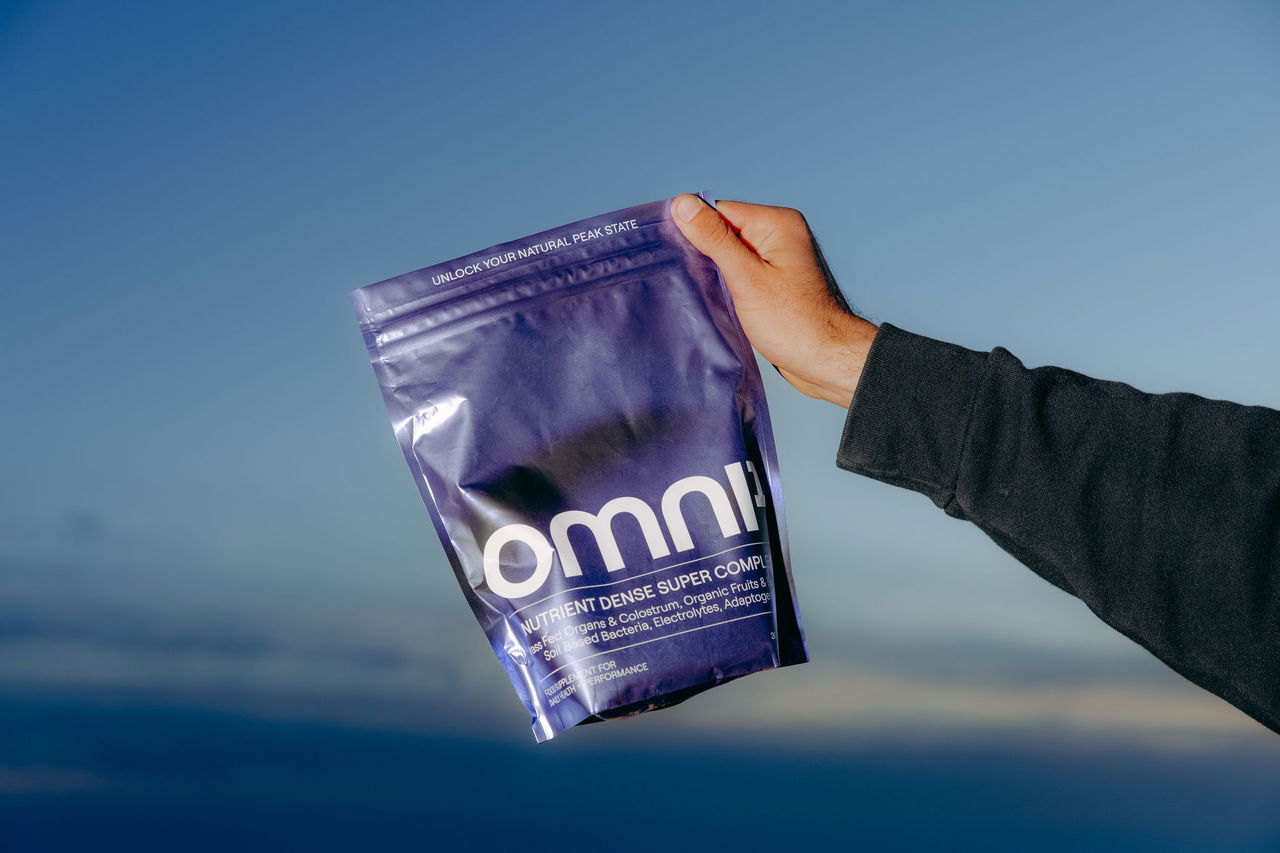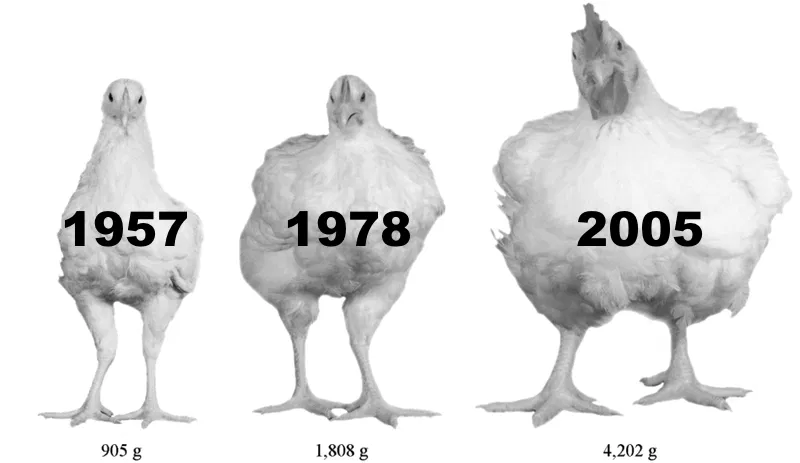Why a Whole-Food Diet is Not Enough For Peak Health and Performance in 2026


Written by
Sebastian Hallqvist, Founder & CEO
8 min read


The world of nutrition is full of tribalism and online shouting matches.
Still, there's one thing nearly everyone seems to agree on: the value of a whole food diet.
If you're familiar with our company you'll know we 100% advocate for this as well.
But I'm here to tell you that a whole food diet – even if well executed – is no longer enough to unlock peak health and performance.
There are countless obstacles in the modern environment that will block you from getting the nutrition you deserve… unless you know exactly what to look for and how to adapt.
And that's what we'll cover in this article.
Let's dive in!
Modern Foods Are Less Nutrient-Dense
To feel and perform your best, you need to give your body the right fuel.
But here's the problem: foods today are becoming less and less nutrient-dense.
All factors considered, it's safe to assume that the average supermarket whole food today contains 50-95% less nutrients than the same food enjoyed by your grandparents.
Why are modern foods less nutrient-dense?
Two major trends have contributed to the situation:
Changing farming practices
Decreasing food freshness
Industrial Farming & Declining Soil Health
To meet the demands of a growing population, farmers in the last ~100 years have been incentivized to optimize for size, yield and pest resistance over nutrient density in foods.
Methods like selective breeding, chemical fertilizers and the use of growth factors and animal feed designed to promote weight gain have been widely adopted.
As a result, the total volume of food produced has been steadily increasing – but the total nutrients available have stayed the same or even decreased.
When we think about the nutrients in our food, it's easy to forget that they must come from somewhere.
In a natural system e.g. a traditional regenerative farm, those nutrients come from organic materials (dead animals & plants, manure) decaying, returning to, and building up the soil in a closed cycle.
But in the now conventional industrial style of farming, that cycle is broken, leaving fewer and fewer nutrients for animals and plants to absorb, and causing rapid erosion of topsoil.
In fact, the WWF reports that half of the topsoil on the planet has been lost in the last 150 years.
There are several downstream consequences of this, one being lower nutrient density in our foods.
According to research from the Bionutrient Institute, modern foods can vary drastically in nutrient value based on a variety of factors like geography, soil health, farming practices and more.
Some examples:
Apple – 3x variation
Zucchini – 5x variation
Lettuce – 7x variation
Beetroot – 9x variation
Grape – 15x variation
Meaning = you may have to eat up to 3 apples, 5 zucchinis, or 15 (!) grapes to get all the nutrients you think you are getting from just one!
Decreasing Food Freshness
Another overlooked factor in the nutrient density equation is food freshness.
Animals in their natural habitat consume the bulk of their diet as fresh it gets (just think of a predator killing and immediately consuming its prey, or a ruminant grazing on live grasses).
Compare this to us modern humans: most supermarket foods are now anywhere from weeks to months old.
Why is food freshness important?
Because most foods lose significant nutrients just days after harvest.
E.g. according to research from Penn State, spinach loses 53% of its folate within eight days, even while refrigerated.

These factors combined – less nutrient density and declining food freshness – lead to significantly less nutritious and lower quality foods (on average) than those our grandparents enjoyed.
Please note that we are only talking about a hypothetical 100% whole food diet here, and not even touching on the fact that increasing amounts of ultra-processed foods are making their way into our food supply…
This could help explain why recent data from the Linus Pauling Institute shows that virtually 100% of people now have inadequate intakes of at least one nutrient.
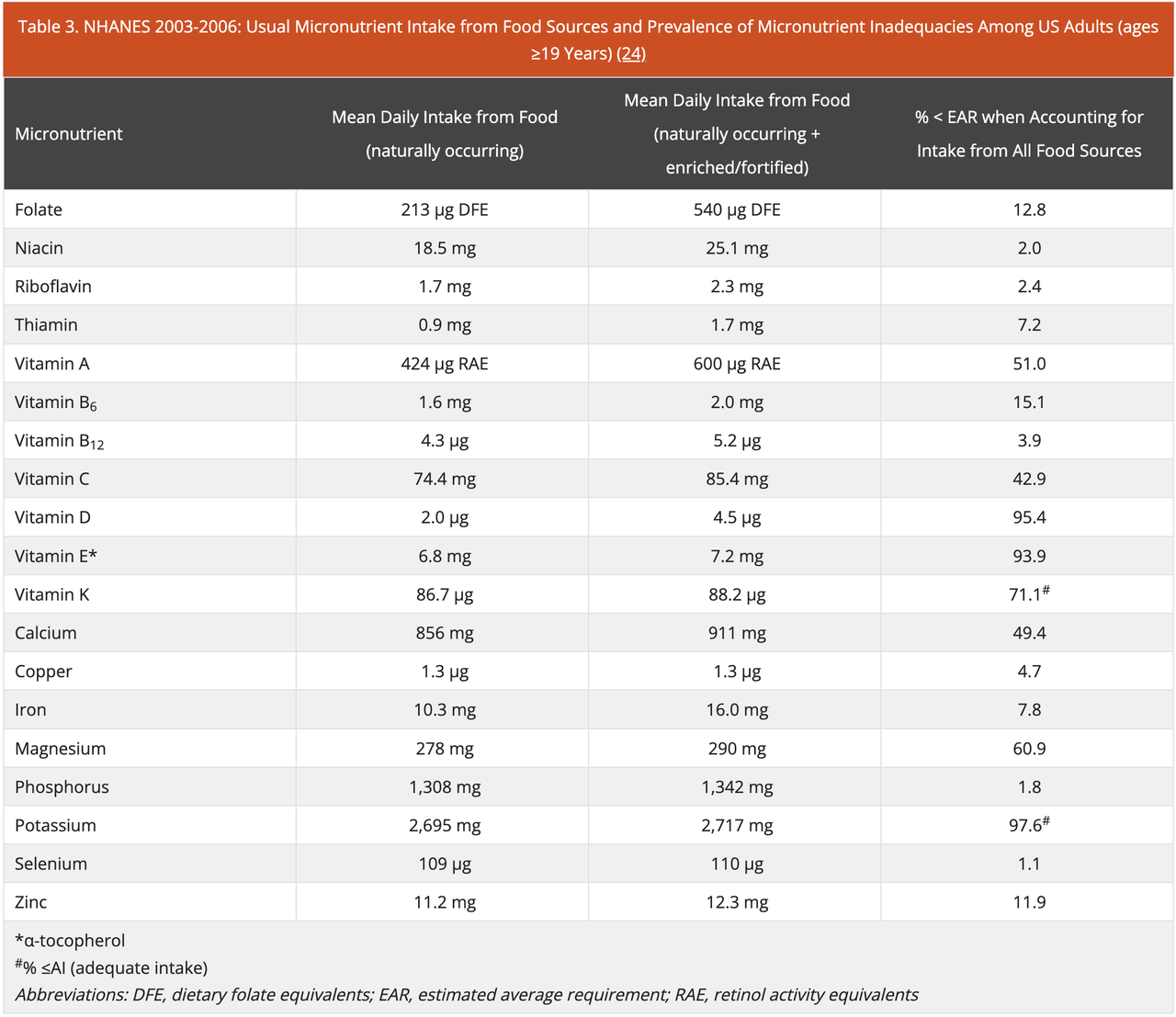


Micronutrient inadequacies in US adults
The Challenge of Modern Living: Eating Out and Traveling
Even in situations where you have full control over how and where you source your food, its not easy to consistently find truly high-quality foods.
But most of us also want to live dynamic, vibrant and full lives. We want to chase after our dreams, build a career, and have diverse life experiences.
We cannot always make diet the fulcrum of our lives – or else we’d be severely limited in other areas.
This introduces a couple more challenges:
Eating at restaurants
Traveling
Restaurants are generally incentivized to use any means to make food as delicious as possible (so you will tell your friends and come back to eat there again) while using the cheapest possible ingredients (so they can make a profit).
Now, there is nothing wrong with tasty food (in fact, perhaps the most backwards idea in our culture today is that healthy food is supposed to taste bad...)
But restaurants will often compromise on the health aspect of food to get there (e.g. adding huge amounts of sugar and fats or excessively processing foods instead of using high-quality ingredients).
When you travel, things get even trickier.
You're not just forced to eat at restaurants more often. You also have less knowledge of where the healthiest restaurants and food stores are (in many places, there might not be any good alternatives at all...)
And unless you’re lugging around a gigantic suitcase, you don’t have the same access to all your healthy food staples, supplements, or anything else that may be part of your normal health routine at home.
Missing Nutritional Elements in The Modern Environment
On top of all this, there are numerous nutritional elements that used to be a key part of a natural human diet, which are now exceedingly rare or completely missing from our daily environment.
These may be categorized as:
Forgotten superfoods
Minerals and electrolytes
Microbial diversity
Forgotten Superfoods
The following are examples of true natural superfoods that have historically been a vital part of our diet, which we generally no longer eat:
Organ meats
Colostrum
Bones, Marrow and Cartilage
Bee Pollen and Propolis
Functional foods like Mushrooms, Roots, and Herbs
These foods are inherently some of the most nutrient dense, each providing unique health benefits that most of us currently miss out on.
Electrolytes
Electrolytes are specific minerals that carry an electric charge.
Such minerals, like calcium, chloride, magnesium, potassium, and sodium are essential for hundreds of processes in the body, including cellular hydration, muscle contraction and relaxation, nerve function, transporting nutrients, and regulating blood pressure and pH levels.
Our ancestors used to eat fresh mineral-rich foods and drink water from natural springs and streams high in trace minerals.
Today, most of our drinking water goes through treatment plants where minerals are filtered out. And again, our foods contain less of all nutrients, including electrolytes.
As a result, electrolytes are among the most underconsumed nutrients today.

Natural spring water stream.
Microbial Diversity
As humans, we are designed to live in constant harmonious interaction with the microbial world – through contact with soil and other objects in nature, eating fresh foods, and drinking from natural water sources.
Today, we are far removed from many of the microbial cultures we would encounter in nature. Our world is becoming increasingly sterile as we’re taught to fear all kinds of “bugs”...
We:
Clean our home environments with harsh chemicals
Wash our hands constantly and use sanitizers
Even sterilize our foods (e.g. it’s common practice for suppliers to wash apples in chlorinated and soapy water before selling them)
This can potentially explain the rapid increase in allergies and autoimmune issues all throughout the population – a concept often referred to as the ”hygiene hypothesis”.

We Need More Nutrients Than Ever
We have now identified several ways in which the modern environment fails to provide the rich nutritional context we need to thrive.
But it gets worse.
Environmental factors like artificial light, chemicals and impurities in our air and water, drug use, and consumption of ultra-processed foods can cause damage to our cells.
The higher the exposure, the more nutrients are required to compensate and repair the damage.
On top of this, our lives are busier than ever.
We expect high performance in multiple areas of life: work, sports, training, family, travel, social life, and more.
This “always on” lifestyle burns through even more nutrients.
By studying traditional cultures such as the Hadza people of Tanzania, or the Khoisan of South Africa, we can conclude that our ancestors didn't just have access to far richer and more nutrient-dense foods – they also lived MUCH slower and less stressful lives than we do.
In summary, we find ourselves in the following situation:
Our need for high-quality nutrition has never been higher, while access to the precious nutrients we need is at an all time low.
The question is: what to do about it?
Introducing: Natural Performance Nutrition
Our company started like so many others have: we experienced these problems in our own lives and wanted to create a simple and elegant solution for ourselves.
We imagined a SINGLE product that would help compensate for every issue described in this article, and provide daily support for the life we want to live – a life filled with meaningful work, creativity, lots of physical activity and new experiences.
When we looked at what was already available in the market, nothing even came close to what we imagined…
Most all-in-one products are limited to plant-based ingredients and filled with synthetic nutrients, dyes, emulsifiers and sweeteners.
We decided to make something completely new... using only 100% natural and real food ingredients (including animal-based ones) and absolutely NO sneaky additives or chemicals.
We're calling it OMNI¹ – it's every true superfood and natural compound we wish we could consume every day, no matter where we are or what life throws at us – all packed into one convenient serving.
OMNI¹ helps add back nutrient density by giving consistent access to the most nutrient-dense & potent superfoods in concentrated freeze-dried powder form:
grass-fed colostrum
grass-fed beef organs
organic superfruits & berries
organic kelp
bee pollen & propolis
soil-based probiotics
Plus ~20 more ingredients of similar quality that are otherwise missing or hard to find in the modern environment.
Now, does OMNI¹ replace eating the highest quality, most nutrient-dense foods, as consistently, in their whole form?
Absolutely not!
It's not meant to replace a high-quality whole-food diet (and you should run from any product that makes this claim).
Instead, it's a part of what we call Natural Performance Nutrition – a system for filling in nutritional gaps and ensuring the best nutrition possible in the modern environment, so you can unlock your peak human state every single day.
All you need to do is mix OMNI¹ with any cold liquid and enjoy, preferably in the first half of the day.
Then, during the rest of the day, you eat a wide spectrum of tasty foods which are naturally programmed to promote focus, energy, resilience to infections and stress, and long term whole-body wellness.
Which foods exactly?
Glad you asked!
We invested hundreds of hours compiling data and designing a comprehensive guide for how to eat the Natural Performance Diet.
It’s packed with crisp, simple visuals showing you exactly what to eat and drink to feel and perform your best every single day.
If you want to check it out, enter your email and we'll send it to your inbox for free.
Closing Thoughts
In a perfect world, our environment would naturally provide all the inputs required to unleash our full human potential.
And we're hopeful that over a long enough time horizon, our product and others like it will become unnecessary (better food options and positive change is becoming more available by the day).
It’s a bit like the dating app Hinge – ”the only app designed to be deleted”.
Similarly, we would love it if in 20-30 years, there will be much less of a need for a product like OMNI¹.
But in the meantime, we’ll be using it every single day as the simplest and most convenient way to fill nutritional gaps and show up as our natural peak selves.

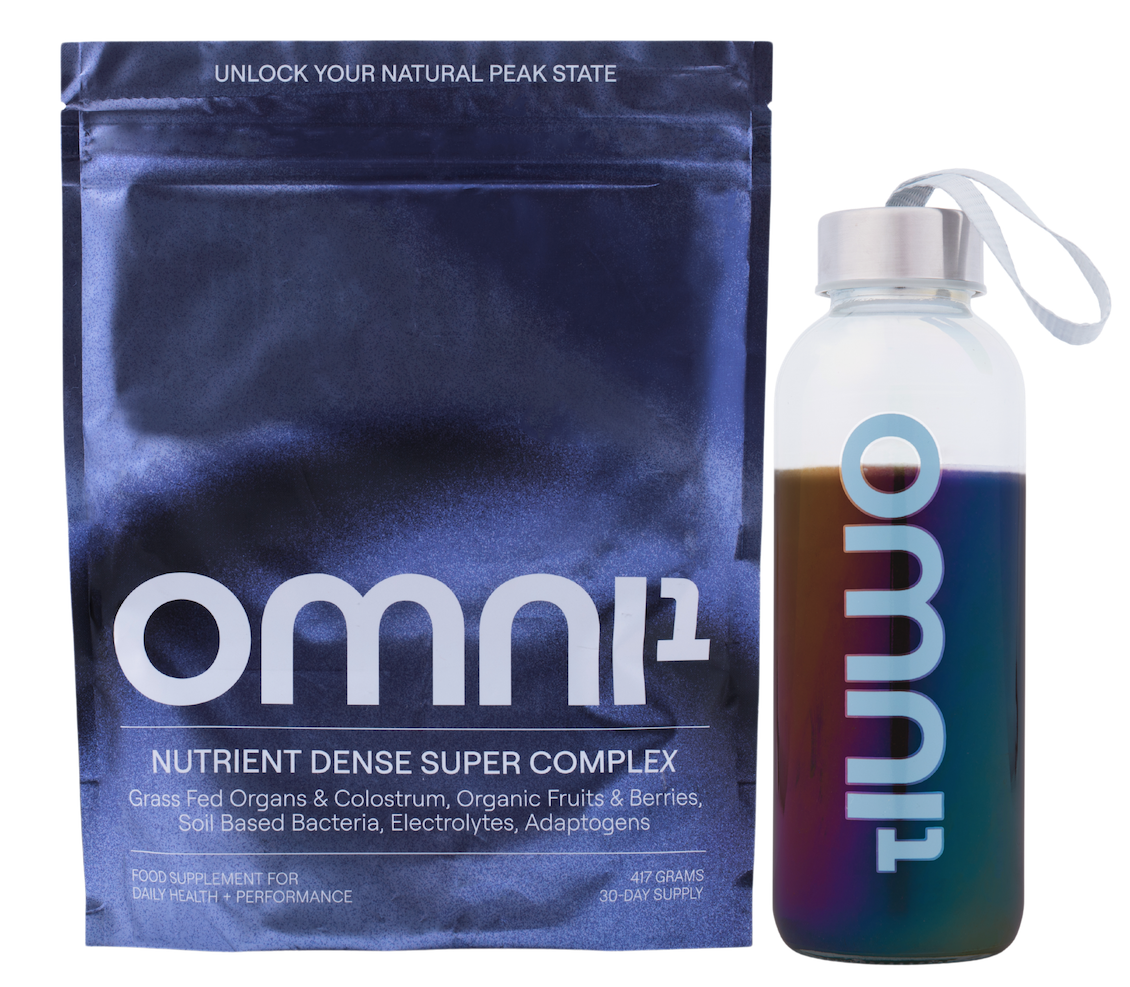
Learn about OMNI¹



